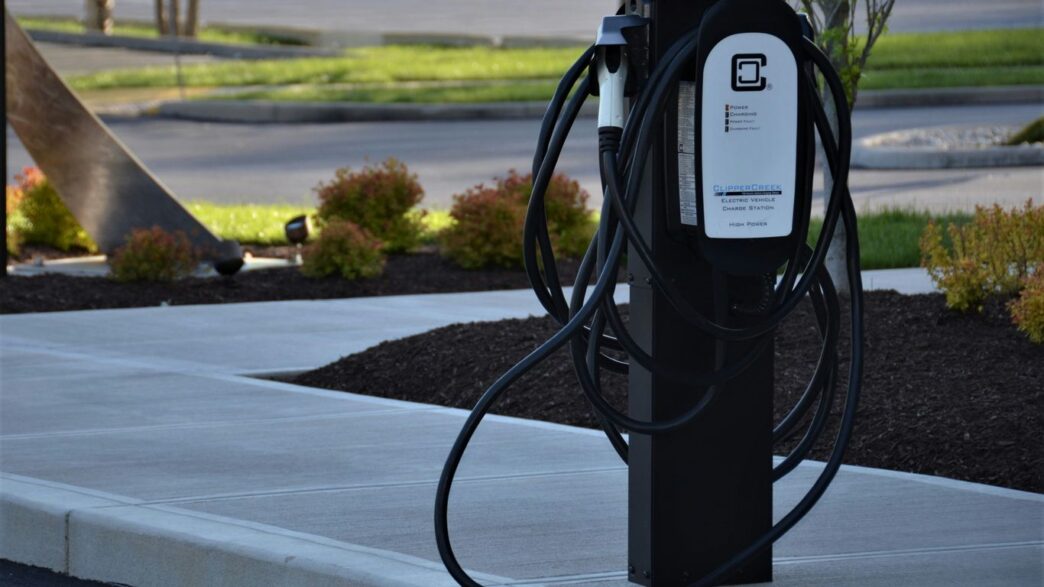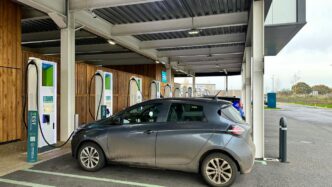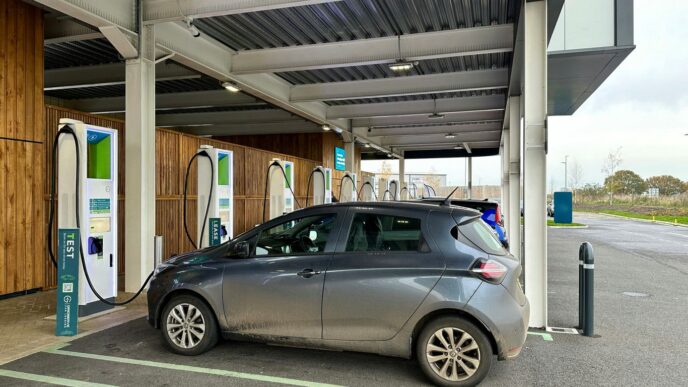October 2025 is here, and if you’re thinking about getting into an electric car, now might be a good time to look at leasing. Automakers are putting out some pretty decent deals on EVs and hybrids. It’s not always straightforward, though, with different structures and regional offers. We’ve sifted through the noise to help you find the best electric car lease deals out there this month. Let’s see what’s available.
Key Takeaways
- Leasing an electric car can be a smart move, often meaning lower monthly payments and less upfront cost compared to buying, especially with manufacturers passing on some EV incentives.
- Deals can change a lot depending on where you live, so always check local offers and don’t be afraid to shop around with different dealerships.
- Manufacturer incentives, like lease credits or special financing rates, can significantly lower your monthly payments, making certain EVs more affordable.
- When comparing deals, look beyond just the monthly price. Consider the MSRP, the length of the lease, mileage limits, and any fees involved to get the full picture.
- Don’t forget about hybrid and plug-in hybrid options; they can also present good leasing opportunities if a full EV isn’t quite right for you yet.
Navigating October’s Electric Car Lease Landscape

October 2025 is shaping up to be a pretty interesting month for electric car leases. Even though the big federal tax credit isn’t directly applied to leases anymore, manufacturers are really stepping up with their own incentives. It’s like they know people are still looking for good deals on EVs, and they’re making it happen. This means you might find some surprisingly good offers if you know where to look.
Understanding Lease Deal Structures
Lease deals can seem a bit complicated at first glance, but they mostly boil down to a few key things. You’ve got the monthly payment, the lease term (how many months you’re leasing for), and the amount due at signing. A lot of the advertised deals show a down payment, but we’re going to focus on zero-down options to make comparing easier. Remember, the manufacturer often gets the federal tax credit and passes some of that savings onto you through the lease, which is why EV leases can be so competitive right now. It’s a smart way for them to move inventory and for you to get into a new electric car without a huge upfront cost.
Zero Down Payment Comparisons
When you see a lease deal advertised, it often includes an amount due at signing. This can include the first month’s payment, a security deposit, and other fees. To really compare apples to apples, we’re looking at deals where you put $0 down. This means the monthly payment will be higher than a deal with a down payment, but it gives you a clearer picture of the car’s actual lease cost over time. It’s important to see what the true monthly cost is without that initial chunk of cash. Keep in mind that these zero-down figures usually roll the acquisition fee into the monthly payment, so it’s all accounted for.
Regional Variations in Offers
One thing to always remember is that lease deals aren’t the same everywhere. What’s a great offer in California might not be available in Texas, or vice versa. Automakers tailor these incentives to specific markets. So, while we can look at national trends and advertised specials, you’ll absolutely need to check with your local dealership or the manufacturer’s website for the most accurate offers in your area. Sometimes, there are even extra incentives tied to state or local tax credits, so it’s worth doing a little digging specific to your location. You can often find these deals listed on manufacturer websites, like Audi’s current electric offers.
Maximizing Value: The Best Electric Car Lease Deals
Finding the best electric car lease deal can feel like a treasure hunt, especially with all the different numbers and incentives out there. It’s not just about the sticker price; it’s about what you get for your money each month. The key is to look beyond the advertised monthly payment and understand how it relates to the car’s actual value.
Automakers are really pushing EVs this year, and that means some pretty sweet lease specials are popping up. But not all deals are created equal. We’ve crunched the numbers to help you spot the leases that offer the most bang for your buck. This often involves looking at how the manufacturer’s incentives, like those passed-through federal tax credits for leased vehicles, affect the final price.
Identifying Top ‘Bang for Your Buck’ Leases
When we talk about ‘bang for your buck’ in leasing, we’re essentially measuring how much car you’re getting for your monthly payment. A simple way to look at this is by comparing the Manufacturer’s Suggested Retail Price (MSRP) to the zero-down monthly payment. A higher ratio here usually means a better deal. For example, a car with a $50,000 MSRP leased for $400 a month (with zero down) offers more ‘value’ than a $50,000 car leased for $500 a month.
Here’s a look at how some deals stack up, calculated with a zero-down payment to give you a clearer picture:
| Vehicle | MSRP | Monthly Payment (0 Down) | Bang for Buck (MSRP/Payment) |
|---|---|---|---|
| 2025 Hyundai Ioniq 5 SE | $51,820 | $318 | 167 |
| 2026 Nissan LEAF SV+ | $36,325 | $609 | 60 |
| 2025 Tesla Model S Plaid | $99,990 | $1,753 | 57 |
Keep in mind that these ‘bang for your buck’ scores are a guide. Deals can change quickly and vary by region.
Analyzing MSRP vs. Monthly Payments
It’s easy to get caught up in just the monthly payment. But a low monthly payment might come with a higher upfront cost or a shorter lease term, which could mean you’re paying more overall. Always look at the total cost of the lease, which includes the monthly payments multiplied by the lease term, plus any money due at signing (like the first month’s payment, security deposit, and fees).
When comparing, try to normalize the deals. For instance, if one car has a $400/month payment for 24 months and another has a $350/month payment for 36 months, you need to do a little math to see which is truly cheaper. A $400/month lease for 24 months totals $9,600, while a $350/month lease for 36 months totals $12,600. In this case, the lower monthly payment isn’t necessarily the better deal long-term.
Leveraging Manufacturer Incentives
Manufacturer incentives are where some of the best lease deals hide. These can include:
- Lease Cash: Direct discounts from the manufacturer that lower your monthly payment.
- Lease Loyalty Bonuses: Extra savings if you’re currently leasing a vehicle from the same brand.
- Special Financing Rates: Sometimes manufacturers offer lower money factors (the lease equivalent of an interest rate).
- Passed-Through Tax Credits: As mentioned, many manufacturers are applying the federal EV tax credit to leased vehicles, significantly reducing the lease cost. This is a big reason why EV leases can be so attractive right now.
Always check the manufacturer’s website or ask your dealer specifically about current incentives. These can often be combined with other offers, but sometimes they have restrictions, so read the fine print.
Key Electric Vehicle Lease Offers This Month
October 2025 is shaping up to be a pretty good month if you’re looking to lease an electric car. Automakers seem to be keeping lease deals steady, even with the federal tax credit changes. It looks like many manufacturers are passing on some of the savings from that credit directly into lease agreements, which is great news for your wallet. Remember, these deals can change based on where you live, and your credit score plays a part too. It’s always a good idea to check with your local dealer for the most accurate pricing.
Luxury EV Lease Specials
If you’re eyeing something a bit more upscale, there are some interesting options. BMW, for instance, has the iX xDrive45 available for around $699 a month over 36 months, with about $5,129 due at signing. For those who prefer something larger, the BMW i7 eDrive50 Sedan is listed at roughly $969 per month for 36 months, requiring about $8,229 upfront. Audi also has its Q6 e-tron listed at $899 per month for 36 months, with a down payment of around $5,169. These luxury options often come with more features and a premium feel, but naturally, they come with a higher monthly cost.
Affordable Electric Sedan Deals
Looking for something more budget-friendly? Kia is offering some compelling deals on its electric sedans. The 2025 Niro EV Wind is advertised at a low $169 per month for 24 months, with $3,999 due at signing. Similarly, the 2025 EV6 Light Long Range RWD is available for about $309 per month over 24 months, also with $3,999 due at signing. These are great entry points into the EV market without breaking the bank. The Hyundai Ioniq 5 SE is a standout, with a reported monthly payment of just $318 and a MSRP of $51,820, giving it a fantastic ‘bang for your buck’ score.
Electric SUV Leasing Opportunities
SUVs continue to be popular, and there are plenty of electric SUV leases to consider this October. Audi’s Q4 e-tron is listed at $695 per month for 24 months, with $4,640 due at signing. For a slightly larger option, the Audi A6 e-tron Sportback is around $899 per month for 36 months, requiring about $6,493 at signing. Cadillac is also making a splash with its Lyriq, which can be leased for about $579 per month for 36 months, with $4,849 due at signing. These SUV deals offer practicality and space, making them a good choice for families or those who need a bit more cargo room.
Manufacturer-Specific Lease Incentives
When you’re looking for an electric car lease, it’s smart to see what the car companies themselves are offering. They often have special deals that can make a big difference in your monthly payment. It’s not just about the sticker price; these manufacturer incentives can really change the game.
Audi’s October Leasing Programs
Audi is putting some good offers out there for October. For instance, the 2025 Audi Q4 E-Tron and Q6 E-Tron are both getting a $6,000 bonus cash incentive. This is a nice chunk of change that can lower the overall cost of your lease. The 2025 Audi A6 E-Tron also has a $6,000 bonus cash offer. Keep in mind, these deals can change, so it’s always a good idea to check with your local dealer for the most current information and availability.
BMW’s Current Electric Offers
BMW has a few compelling lease options this month. The 2025 BMW i4 is available with a lease starting at $399 per month for 36 months, with $4,999 due at signing. Plus, there’s a $7,500 purchase credit, which is pretty significant. If you’re looking at something a bit larger, the 2025 BMW iX has a lease deal for $699 per month for 36 months with $5,129 due at signing, also including a $7,500 purchase credit. For the plug-in hybrid fans, the 2025 BMW 750e xDrive is listed at $1,099 per month for 39 months with $8,979 due at signing, and it comes with a $5,000 bonus cash offer. They also have attractive APR rates on some models, like 2.99% for up to 60 months on the i4 and i7.
Hyundai’s Competitive EV Leases
Hyundai is really trying to get people into their EVs with some attractive lease specials, especially on the Ioniq 5. You can find leases for the 2025 Hyundai Ioniq 5 starting as low as $189 per month for 24 months with $3,999 due at signing for the SE Standard Range model. Even the higher trims like the Limited RWD are leasing for around $279 per month for 24 months with the same down payment. They’re also offering a $7,500 discount on purchasing from dealer stock, which is a great incentive if you decide to buy instead of lease. Plus, a 1.99% APR for up to 60 months is available on some models, which is a really good financing rate.
Beyond the Sticker Price: Additional Lease Considerations
So, you’ve found a great electric car lease deal, but hold on a second. There’s more to consider than just that monthly payment number. It’s really important to look at the whole picture before you sign on the dotted line.
Impact of Credit Score on Lease Availability
Your credit score is a big deal when it comes to leasing. Think of it as your financial report card. A higher score generally means you’ll qualify for the best lease offers, often with lower monthly payments and less money due at signing. If your credit isn’t top-notch, you might face higher rates or even be denied a lease altogether. It’s worth checking your credit report before you start shopping around. Some manufacturers might even have special programs for those with less-than-perfect credit, but these usually come with less favorable terms.
Understanding Acquisition and Disposition Fees
These are two fees that often catch people by surprise. The acquisition fee is basically the cost the leasing company charges to set up the lease. It can be rolled into your monthly payments or paid upfront. Then there’s the disposition fee, which you pay at the end of the lease when you turn the car in. This covers the cost of the dealership getting the car ready to be sold again. Some leases waive this fee if you lease another car from the same brand, which is a nice perk to look out for.
The Role of Regional Tax Credits
Tax credits can be a bit tricky, and they often depend on where you live. While there used to be a federal tax credit for purchasing EVs, leasing works a little differently. Sometimes, the manufacturer passes on a portion of the federal tax credit to you in the form of a lower lease payment. On top of that, some states or even local municipalities offer their own tax credits or rebates for electric vehicles. These can significantly reduce your overall cost, so it’s definitely worth researching what’s available in your specific area. You can often find this information on your state’s energy or environmental agency website. For example, some areas might offer incentives that make deals like the 2025 Kia Niro EV even more attractive.
Exploring Hybrid and Plug-In Hybrid Lease Options
So, you’re thinking about a hybrid or plug-in hybrid (PHEV) lease this October? That’s a smart move, especially if you’re not quite ready to go full electric but still want to save on gas and reduce your emissions. These vehicles offer a nice middle ground, giving you the flexibility of gasoline power when you need it and electric power for shorter trips.
It’s a great time to look into these options because manufacturers are really pushing them with some attractive lease deals.
Let’s break down what you might find this month:
Comparing Hybrid Lease Deals
When you’re looking at traditional hybrids, the lease terms can vary quite a bit. You’ll find offers on everything from compact sedans to larger SUVs. Keep an eye out for deals that bundle a reasonable monthly payment with a manageable amount due at signing. For example, some hybrid SUV lease deals might have a 36-month term with a minimum spend of around $16,527 by the end of the lease, including your initial payment. It’s all about finding that sweet spot that fits your budget and driving needs.
Plug-In Hybrid Savings This October
PHEVs are where things get really interesting. They offer a decent electric-only range, perfect for daily commutes, and then the gas engine kicks in for longer journeys. This means you can potentially do most of your driving on electricity, especially if you charge regularly. Many manufacturers are offering special lease incentives on their PHEV models right now. You might see offers like:
- Low Monthly Payments: Some PHEVs are leasing for under $300 a month, though this often depends on the trim level and the amount due at signing.
- Attractive Financing Add-ons: While not strictly part of the lease, some deals include 0% APR financing for purchases, which can be a good sign of manufacturer support for the model.
- Bonus Cash and Discounts: Keep an eye out for additional cash allowances or loyalty/conquest discounts that can bring down the overall cost of your lease.
Best Hybrid Lease Value
Finding the best value means looking beyond just the monthly payment. Consider the total cost over the lease term, the vehicle’s features, and its expected reliability. Sometimes, a slightly higher monthly payment on a vehicle with a better residual value or more included features can be a better deal in the long run. Don’t forget to factor in potential savings on fuel and maintenance, too. It’s worth comparing a few different models to see which one gives you the most bang for your buck. For instance, you might find a 2025 Alfa Romeo Tonale Eawd with a monthly payment that seems competitive, but it’s important to look at the total cost and what you’re getting for that price.
Strategic Leasing for Electric Vehicles
So, you’re thinking about leasing an electric car? It’s a pretty smart move, especially with how fast EV tech is changing.
Leasing as an Alternative to Purchasing EVs
Buying an EV outright can be a big financial commitment. Prices are still higher than gas cars, and let’s be honest, nobody wants to be stuck with a car that feels outdated in just a few years. Leasing lets you drive a new EV for a set period, usually two to four years, without the huge upfront cost or the worry of long-term depreciation. It’s like renting a car, but for your daily commute. Plus, you often get lower monthly payments compared to financing a purchase, which frees up your budget for other things. This makes it a really accessible way to experience the latest electric technology without breaking the bank.
Warranty Coverage and Depreciation Factors
One of the best parts about leasing an EV is that the entire lease term usually falls within the vehicle’s manufacturer warranty period. This means most of your maintenance and any unexpected repairs are covered. You don’t have to stress about those big, potentially costly repairs that can pop up with older cars. EVs also tend to depreciate a bit faster than traditional cars because the technology is evolving so quickly. When you lease, the depreciation risk is on the manufacturer, not you. You just hand the keys back at the end of the lease, and they deal with it. It’s a pretty sweet deal.
The Benefits of Shorter Lease Terms
Opting for a shorter lease term, say 24 or 36 months, has some real advantages. For starters, you’ll always be driving a relatively new car. This means you’ll benefit from the latest safety features, improved battery technology, and updated infotainment systems. It also means you’re less likely to encounter major issues since the car will still be under warranty. While longer leases might have slightly lower monthly payments, the shorter terms allow you to upgrade more frequently, ensuring you’re always in a modern, efficient electric vehicle. It’s a great way to stay current with EV advancements without the commitment of ownership.
So, What’s the Takeaway for October 2025?
Alright, so we’ve looked at a bunch of electric and plug-in hybrid car lease deals for October 2025. It looks like there are still some pretty good options out there, even with the federal tax credit changes. Remember, these deals can change fast and often depend on where you live, so it’s always a good idea to check with your local dealer. Don’t forget to compare those monthly payments and what’s included, especially since some manufacturers are passing on savings from those credits. Happy hunting for your next electric ride!
Frequently Asked Questions
What are the best electric car lease deals happening this October?
This October, you can find great lease deals on electric cars from many brands. We’ve gathered information on special offers, looking at how much car you get for your money. Deals often change, so it’s good to check for the latest offers from manufacturers like Hyundai, Audi, and BMW, as they frequently have competitive lease specials.
Can I lease an electric car with no money down?
Yes, many lease deals allow you to put zero money down. This means you won’t need a large upfront payment. The cost is spread out into your monthly payments, making it easier to get into a new electric vehicle without a big initial expense. We’ve calculated many of these deals to show you the ‘zero down’ monthly cost.
How does the federal EV tax credit affect lease deals?
The federal EV tax credit of up to $7,500 is usually for buying, not leasing. However, many car makers get this credit when you lease and pass some of that savings onto you through the lease deal. This often makes leasing an electric car a really good value right now.
What’s a good ‘Bang for Your Buck’ score for a lease deal?
The ‘Bang for Your Buck’ score helps you see how much car you’re getting for the monthly price. It’s figured out by dividing the car’s total price (MSRP) by the monthly lease payment. A score above 80 is considered excellent, meaning you’re getting a lot of car for your money. Higher is better!
Are lease deals the same everywhere?
No, lease deals can be quite different depending on where you live. Some offers are only available in certain areas or states. It’s always a good idea to check with your local car dealerships or look at the manufacturer’s website for deals specific to your region. Don’t forget to factor in local taxes and fees too.
Why is leasing an electric car a good option?
Leasing an electric car can be a smart choice because it often means lower monthly payments compared to buying. You also get to drive a new car every few years with full warranty coverage. Plus, you don’t have to worry about selling the car later, as electric cars can lose value faster than gas-powered cars.














